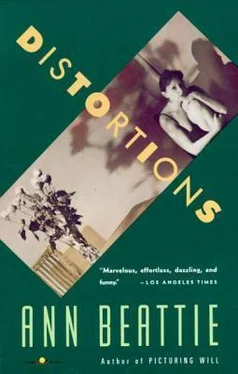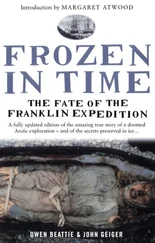Ann Beattie - Distortions
Здесь есть возможность читать онлайн «Ann Beattie - Distortions» весь текст электронной книги совершенно бесплатно (целиком полную версию без сокращений). В некоторых случаях можно слушать аудио, скачать через торрент в формате fb2 и присутствует краткое содержание. Год выпуска: 1991, Издательство: Vintage, Жанр: Современная проза, на английском языке. Описание произведения, (предисловие) а так же отзывы посетителей доступны на портале библиотеки ЛибКат.
- Название:Distortions
- Автор:
- Издательство:Vintage
- Жанр:
- Год:1991
- ISBN:нет данных
- Рейтинг книги:5 / 5. Голосов: 1
-
Избранное:Добавить в избранное
- Отзывы:
-
Ваша оценка:
- 100
- 1
- 2
- 3
- 4
- 5
Distortions: краткое содержание, описание и аннотация
Предлагаем к чтению аннотацию, описание, краткое содержание или предисловие (зависит от того, что написал сам автор книги «Distortions»). Если вы не нашли необходимую информацию о книге — напишите в комментариях, мы постараемся отыскать её.
Distortions — читать онлайн бесплатно полную книгу (весь текст) целиком
Ниже представлен текст книги, разбитый по страницам. Система сохранения места последней прочитанной страницы, позволяет с удобством читать онлайн бесплатно книгу «Distortions», без необходимости каждый раз заново искать на чём Вы остановились. Поставьте закладку, и сможете в любой момент перейти на страницу, на которой закончили чтение.
Интервал:
Закладка:
“Did you write a note?” Mary says.
“I left it on the table for you.”
“What did you say?”
“I said you had a sore throat.”
“She always has something to say about your notes.”
“What do you mean? What has she said?”
“When I put it on her desk she reads it right away.”
“That’s her job, Mary.”
“As soon as she reads it she says something to me. The last time she came over to my desk and asked me if my cold was gone.”
Mrs. Wright is turning eggs. What Mary says must be true. Once she forgot to write a note when Mary had been sick, and the homeroom teacher had called at home that night. Another time the guidance counselor called to say that he was disturbed by the number of absences. What is she supposed to say to these people? She tells them that it was her mistake not to have sent a note promptly, that it’s better to nip things in the bud so Mary doesn’t miss a whole week of school, that Mary has a good academic average.
Mary is eating her breakfast. But it is late — eight-thirty — and she should hurry. It makes people sick to hurry, it gives them indigestion. She sits down across from Mary.
“You uncle Marshall called last night. Grandma isn’t feeling well, and your father wants us to visit her tonight.”
“What’s wrong with her?”
“She had a cold … she has trouble sleeping.”
“She just wants to stay up late and watch television.”
“No, she doesn’t,” she says angrily. “Edna took her to a doctor and he had to give her medication.”
Mary does not look up.
“Do you think you’re dressed warmly enough?”
Mary will not continue the conversation. Eventually she gets up, her napkin carefully folded beside her plate. It is eight forty-five. Mary will be late to school, and there is no excuse for tardiness in the note.
“I’ll drive you,” she says.
Mrs. Wright looks at the car through the frosty window.
*
It is cold in the house. She is making soup and baking a roast for dinner. The dog barks and jumps. Marshall is home from work. He and Edna are talking in the living room. Soon they will go out to ride their snowmobiles; she’ll hear them making a circle around the house, will look out the window, cupping her hands so she can see clearly the tracks in the snow. She had been for a ride on the snowmobile with Marshall. She wore scarves on her head, afraid to put on the helmet. There is talk about outlawing snowmobiles. Edna and Marshall are always upset about it. On the television they said people died on snowmobiles, riding them through barbed-wire fences. She rubs her throat, thinking about barbed wire piercing the skin.
“Are you all right, Mom? Sore throat hasn’t come back?”
“No, Marshall.”
“We’re going to take a ride for a few minutes. I’m looking for some bread to feed the birds.”
Marshall has opened the breadbox. Marshall explains everything. The other night when he was fixing a kitchen cabinet she came in for a drink of water and he explained to her how an electric drill worked. He wanted her to hold it. Edna came in. She told Marshall it was too heavy, it vibrated too much. She got the drink of water and left.
One of the women in town, Beverly Brent, helped her husband build a house. She knew Beverly when she was young. The Brents built a big house. But when the house was built she lost twenty pounds and went to New York to become a model. Beverly got sick in New York — she had an appendectomy and returned to the house. She gained weight. Not long ago she came into the store and asked if they needed any saleswomen. Most of the women in town disliked Beverly — the men too. Beverly was never very popular. People liked her sister Miriam. She can remember when they were little girls, fighting on the sidewalk outside the drugstore. Girls fighting! No matter what flavor ice-cream cone Miriam got, Beverly wanted it. Beverly would throw her own ice cream on the sidewalk. Marshall buys her little white bottles of niacin to improve her memory. But she could remember all the things before she took the pills. Edna doesn’t think she needs to take the pills either, but she does it to please Marshall. Marshall takes vitamins every day. He never has a cold. Edna gets sick and can’t go to work. She herself feels pains in her chest and can’t sleep at night because she hears her heart beat and stop, beat and stop.
She is a little surprised that Marshall doesn’t say that he is shutting the door when he shuts the door. She stops stirring the soup and looks at them on their snowmobiles. Marshall looks up and sees her. He points to the snowmobile and smiles. Just as he said, he is going to take a ride on the snowmobile. It is snowing lightly outside. She watches until the snowmobiles are out of sight. She fears they can’t see in the snow, that they’ll run into barbed wire. She goes to the closet and looks on the top shelf. Their goggles are there. She takes them down and puts them on; everything turns bright yellow. She goes back and pours a bag of alphabet letters into the soup. She forgets that she has the goggles on until they begin to steam up. She quickly puts them back on the top shelf so Edna and Marshall won’t see her in them. She goes into the bedroom and empties the niacin pills in the trash and replaces them with aspirin from the medicine cabinet. But she takes too long. She hears Marshall and Edna in the kitchen, realizes that they are calling her. The dog is barking. The soup is boiling over.
*
“What a mess.”
“Your mother’ll kill you.”
It is summer. Mary and Kathy are fifteen. They are in Sam’s, with several boys, and Mary has pizza down her shirt. The boy who caused the accident has spilled his beer on her too. He is twenty-one, the oldest one at the table. Sam saw what happened and is coming over. Mary stands and screams at the boy; he stands too. He is drunk. Mary swings at him — to push, really, not to hit. Sam grabs the boy’s arms.
“It was an accident,” he hollers in Sam’s face.
“Go throw some water on your face,” Sam says.
Kathy is wiping pizza off Mary’s shirt. The pizza sticks to Kathy’s hands, cold and greasy.
“Give her a towel,” Sam says to Beverly.
“Never mind,” Mary says, “I’m going.”
“Let me get it,” Kathy says.
One of the other boys is handing Kathy napkins.
“It’s not doing any good,” Mary says. “I can feel it through my shirt.”
“I’ll give you a ride home,” the boy says.
“It’s got to come off,” Mary says. “She’ll find out I was here.”
“So what? You can’t smell anything on you.”
“I’m just not supposed to be here,” Mary says.
“Okay. I got an idea.”
Mary and Kathy leave Sam’s with the two boys. All four are in the front seat. Sam has come out; he is still trying to give them a towel. Mary thanks Sam and takes it. She puts it in her blouse so she can’t feel the cold pizza against her chest. They are going down a narrow road. The car windows are rolled up because it has started to get cold at night. Nobody talks until they turn into a driveway.
“Go wash your blouse in the bathroom. We can iron it dry.”
“Where are we?”
“My parents’ house.”
“Well, where are they?”
“Out.”
They are going up the front walk. Mary even has pizza in her hair. Everything is sticky. Kathy laughs at her.
“Thanks a lot,” Mary says.
“It’ll come off,” Kathy says.
The boy turns on a light. His friend sits down in the living room. A white cat rubs against his legs, rolls on its back and grabs his pants leg. The boy shakes his leg.
“Where’s the bathroom?”
“Over here.”
Mary and Kathy are in the bathroom. Running water in the sink. Mary starts combing her hair, but it is matted. She scoops some water out of the sink and wets it. She wets it again, then reaches for a comb on the windowsill. She yanks a little and the comb goes through her hair. She pushes her hair behind her ears. Kathy has her blouse. She is dipping it in the water. She soaps it, kneading the material into a tight ball. Mary dries her chest with a towel. It leaves pink stains on the towel. She refolds the towel so the stains are on the inside, and hangs it up again. Kathy is running fresh water in the sink. Someone is knocking on the door. Kathy opens it! Mary steps in back of Kathy.
Читать дальшеИнтервал:
Закладка:
Похожие книги на «Distortions»
Представляем Вашему вниманию похожие книги на «Distortions» списком для выбора. Мы отобрали схожую по названию и смыслу литературу в надежде предоставить читателям больше вариантов отыскать новые, интересные, ещё непрочитанные произведения.
Обсуждение, отзывы о книге «Distortions» и просто собственные мнения читателей. Оставьте ваши комментарии, напишите, что Вы думаете о произведении, его смысле или главных героях. Укажите что конкретно понравилось, а что нет, и почему Вы так считаете.












